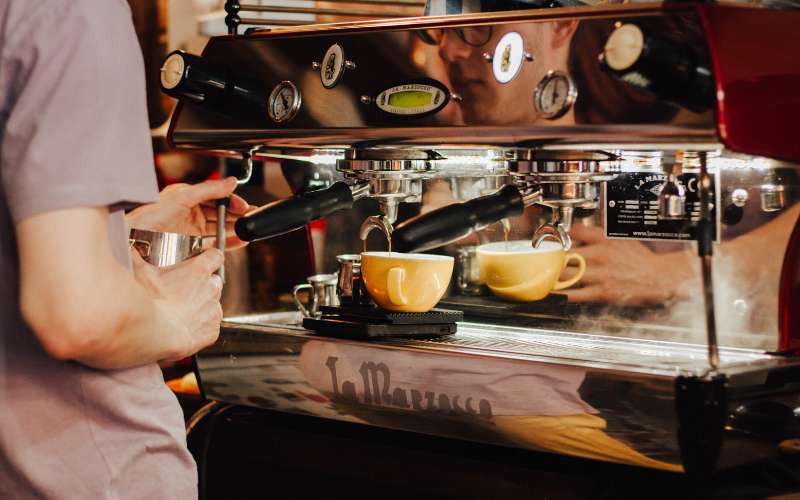Coffee is more than just a morning ritual. It is a high-demand, high-margin business opportunity with proven consumer loyalty. If you are exploring the idea of owning a coffee shop franchise, now is an ideal time to act.
The U.S. coffee market continues to grow, and franchising offers a turnkey way to tap into that demand with a brand that already knows how to win.
A franchise opportunity in the coffee shop industry can present exciting opportunities for those interested in building a new life or career. This offers the chance to grow personally and professionally while making a positive impact in their community.
Whether you are a first-time franchisee or a multi-unit investor, this guide will help you understand what makes coffee franchise businesses a smart investment in 2025—and which franchise model might be right for you.
If you are curious about the coffee franchise industry, discover how it can help you create a more fulfilling life through entrepreneurship and community involvement.
FAQs
The U.S. coffee market is expanding, with Americans consuming over 26 million 60-kg bags of coffee per year. This steady demand, combined with consumer preference for quality and convenience, makes coffee franchises a profitable and resilient business opportunity.
Coffee franchises offer strong brand recognition, established business systems, and high customer loyalty. They provide consistent demand, high margins, and scalable business models with lower overhead compared to full-service restaurants.
Leading franchises are adapting by offering flexible models (like drive-thru or kiosks), modern menus (including teas and smoothies), and tech-enabled service options to meet the demand for speed, quality, sustainability, and personalization.
Owners typically pay ongoing royalty and marketing fees, in addition to operational expenses such as staffing, inventory, and utilities.
Evaluate total investment cost, franchise fees, training and support, brand reputation, available territories, and flexibility of the business model (traditional, drive-thru, kiosk, or mobile).
Why Coffee Shop Franchises Are Growing

The Coffee Market is Expanding
Coffee remains one of the most consumed beverages in the United States. As of 2025, Americans are drinking more than 26 million 60-kg bags of coffee per year, making it a consistent and profitable segment of the foodservice industry.
Momentum is brewing in the coffee market, with consumers continuing to seek high-quality, convenient coffee experiences, and franchises well-positioned to deliver on that demand.
Franchising Offers a Proven Business Model
Franchise ownership allows entrepreneurs to build on an established business framework. You benefit from brand recognition, built-in marketing systems, streamlined operations, and comprehensive training. These, in turn, reduce the risks associated with starting a business from scratch.
The company guides new franchise owners through a clear process, from initial inquiry and evaluation to training and opening, ensuring each step is supported. A strong franchisor provides ongoing support, helping franchise owners stay competitive and efficient from day one.
For more on how to achieve successful franchising, explore proven strategies and essential characteristics.
Coffee Franchises Adapt to Modern Preferences
Today’s coffee drinkers expect more than just caffeine. They want speed, quality, sustainability, and personalization.
Leading coffee shop franchise opportunities like PJ’s Coffee, The Coffee Bean, and Scooter’s Coffee are adapting to these evolving preferences. They offer flexible models, modern menus that include teas and smoothies, and tech-enabled service options.
Modern coffee franchise businesses also offer an expanded range of services to meet diverse customer needs.
Benefits of Owning a Coffee Shop Franchise
- Be in Business for Yourself, Not by Yourself: Franchisees or franchise owners operate independently while leveraging the resources of an experienced franchisor. From training and marketing support to financing options and streamlined operations, you gain the tools to build a strong foundation for growth.
- Build on a Trusted Brand: Franchising offers instant credibility. A well-known coffee shop brand attracts loyal customers and builds trust from the start, helping you drive traffic and engage with your local community.
- Maximize Profit Potential with a Scalable Model: Coffee franchise opportunities typically have lower overhead than full-service restaurants. With high margins and consistent daily demand, this model offers solid ROI, and many owners scale to multiple locations over time.
4 Coffee Shop Franchises to Start this Year
1. Traditional Coffee Shops (Café Model)

This is the full-service sit-down model, offering a wide selection of coffee, pastries, and light meals in a comfortable atmosphere.
Cafes often serve as community hubs, providing a welcoming space for people to gather, work, or relax. Think of locations with seating, Wi-Fi, and long customer dwell times.
A key focus is delivering the perfect cup of coffee to every guest, ensuring each cup meets high standards of quality and consistency. This attention to detail helps build customer loyalty and makes each cup a memorable part of the experience.
Ideal for: High-traffic neighborhoods, downtown areas, or suburban shopping centers.
Total Investment: $500,000 to $800,000
Includes franchise fees, leasehold improvements, equipment, inventory, and opening expenses.
Best for: Owners who want to build community, offer an extended customer experience, and serve as a daily destination.
2. Drive-Thru Coffee Shop

Drive-thru models prioritize speed and convenience. They are designed for commuters, busy professionals, and customers who value quick service. Serving coffee quickly and efficiently is essential in the drive-thru model to meet customer demand and enhance their experience.
Ideal for: Highway-adjacent locations, suburban commuter areas, and locations with limited parking.
Total Franchise Investment: $900,000 to $1,500,000
Includes site development, franchise fee, equipment, and training.
Best for: Investors looking for high-volume, fast-turnover operations with a lean footprint.
3. Kiosk or Express Model

These are compact coffee stations placed in high-traffic locations such as malls, airports, universities, and hospitals. They focus on fast, grab-and-go service.
By combining responsibly sourced coffee, amazing people, and an innovative drive-thru kiosk model, this format offers franchise owners a flexible, lower-overhead way to serve quality beverages with speed and consistency.
Ideal for: Commercial hubs, transit centers, and indoor venues with reliable foot traffic—choosing the right location is crucial to maximize sales and ensure steady customer flow.
Total Franchise Investment: $75,000 to $200,000
Generally includes lower real estate and build-out costs but higher lease rates due to prime location.
Best for: Entrepreneurs seeking a lower-cost entry point with strong sales potential in limited space.
4. Mobile Coffee Truck
Mobile coffee franchises offer flexibility and a unique customer experience. These trucks or carts operate at events, business parks, schools, and private functions.
Ideal for: Urban areas, local events, and markets with seasonal opportunities, especially for serving different parts of the city with a mobile coffee truck.
Total Investment: $50,100 – $175,000,
Includes vehicle purchase, build-out, branding, equipment, and startup inventory.
Best for: Self-starters who want to take coffee to the customer and scale with low fixed overhead.
Choosing the Right Coffee Franchise
Before choosing a coffee franchise, evaluate the following:
- Initial franchise fee and total investment required
- Franchisee support and training programs
- Availability of territories in your target market
- Franchise track record, brand reputation, and customer loyalty
- Flexibility of business model (traditional, drive-thru, kiosk, mobile)
- Review the Franchise Disclosure Document (FDD)
How Much Does It Cost?
Startup costs vary based on location, size, and model. The initial investment includes expenses such as the franchise fee, build-out, equipment, and other startup costs necessary to open your coffee franchise.
To begin the process of opening a coffee business, you should first inquire with the franchisor to understand their requirements and step-by-step application process. Common costs include:
- Franchise fee (usually between $10,000 and $35,000)
- Build-out and leasehold improvements
- Equipment and inventory
- Staff training and uniforms
- Marketing and launch expenses
- Licensing, permits, and insurance
Prospective franchise owners should also consider ongoing fees such as franchise fees and royalty fees once the business is up and running.
Funding Options
Many franchise owners use a combination of personal capital and business financing. Options include:
- SBA loans
- Franchisor financing programs
- ROBS (Rollovers as Business Startups)
- Veteran or minority business grants
- Traditional bank loans or lines of credit
Operating and Growing Your Coffee Business
- Focus on Service and Quality: The success of a coffee franchise depends on consistent product quality, friendly service, and a well-trained staff. Positive customer experiences lead to word-of-mouth referrals and repeat business.
- Build Community Engagement: Successful franchise owners go beyond the product. Hosting local events, supporting schools and nonprofits, and building local partnerships can help establish your coffee business as a neighborhood favorite.
- Track Key Performance Indicators: Strong operators consistently monitor sales, cost of goods sold, labor efficiency, and customer satisfaction. This data drives better decisions and long-term growth.
- Consider Multi-Unit Ownership: Many franchise owners expand into multiple locations within their first few years. Expanding into multiple franchise locations offers significant growth potential and allows owners to capitalize on broader market opportunities.
Conclusion
Franchising a coffee shop provides an exciting opportunity to enter the thriving coffee market with the support of a proven business model. Whether you want to open a traditional café, a trendy coffeehouse, a quick-service drive-thru, or a grab-and-go kiosk, the right franchise can offer you the tools and support to succeed.
Coffee franchise opportunities, such as PJ’s Coffee, Scooter’s Coffee, and Human Bean have showcased the enormous potential of the coffee franchise industry, providing established models for success.
However, these are just a few of the numerous coffee franchise opportunities available across the U.S., each presenting exciting growth prospects for aspiring entrepreneurs.
Ready to take the next step? Let’s spill the coffee beans. Talk to a franchise consultant today to explore the perfect coffee franchise opportunity for you. Whether it’s building community one cup of coffee at a time or scaling a smart business model, your future in the coffee shop industry is brewing.


